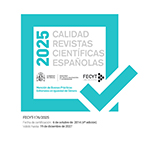Modelo Teórico Integrado de Gamificación en Ambientes E-Learning (E-MIGA)
Resumen
La presencia de elementos lúdicos en el contexto educativo, específicamente en la modalidad de formación E-learning, demuestra que la incorporación de la gamificación sistematiza la experiencia del usuario en base a parámetros relacionados con los juegos. Este artículo presenta la integración de dos modelos conceptuales de gamificación extraídos de la revisión literaria publicada entre el 2012 y el 2015, validando cada una de las dimensiones e indicadores mediante un estudio Delphi con expertos en pedagogía y diseño de juegos. Posteriormente, se exhiben los resultados cualitativos de la aplicación del modelo en 6 aplicaciones móviles educativas analizadas durante 6 meses (junio 2015- enero 2015) manifestando la idoneidad y pertinencia de la categorización. En definitiva, el siguiente modelo construye una vía de conexión entre la base teórica y el análisis empírico de la gamificación con el fin de sobreponerse a los retos de la educación E-learning en el siglo XXI teniendo como última instancia la implicación de futuras investigaciones en la transposición de la estructura a un modelo de utilidad cuantitativo.Descargas
Descarga artículo
Licencia
La Revista Complutense de Educación, para fomentar el intercambio global del conocimiento, facilita el acceso sin restricciones a sus contenidos desde el momento de su publicación en la presente edición electrónica, y por eso es una revista de acceso abierto. Los originales publicados en esta revista son propiedad de la Universidad Complutense de Madrid y es obligatorio citar su procedencia en cualquier reproducción total o parcial. Todos los contenidos se distribuyen bajo una licencia de uso y distribución Creative Commons Reconocimiento 4.0 (CC BY 4.0). Esta circunstancia ha de hacerse constar expresamente de esta forma cuando sea necesario. Puede consultar la versión informativa y el texto legal de la licencia.











